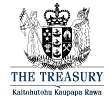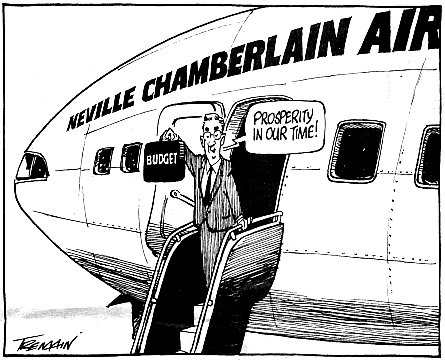
-
Budget 2001
- NO MORE GAPS
 Minister of Finance Michael Cullen says last year's Budget was characterised by its
concern with social issues and the carrying out of pre-election promises. This Budget, according
to Cullen, is characterised by a strong commitment to sound fiscal management, and an
equally strong commitment to the transformation of the economy. The "Closing the Gaps"
catchphrase of the previous Budget was not mentioned in the Finance Minister's speech. And there is
little new money in the announcements for action on jobs or for Maori.
Minister of Finance Michael Cullen says last year's Budget was characterised by its
concern with social issues and the carrying out of pre-election promises. This Budget, according
to Cullen, is characterised by a strong commitment to sound fiscal management, and an
equally strong commitment to the transformation of the economy. The "Closing the Gaps"
catchphrase of the previous Budget was not mentioned in the Finance Minister's speech. And there is
little new money in the announcements for action on jobs or for Maori.
Cullen: "Social spending does not have the same prominence in policy terms in this years Budget as in last year's, but it nevertheless continues to take the lion's share of increased spending." Cullen argues that the key to NZ clawing its way back into the top half of the OECD nations is in "increasing human capital" which means moulding NZ'ers into a more highly skilled and more productive workforce. The Budget emphasizes this in announcing the expansion of industry training and the focusing of the tertiary education sector.
Industry training. The government has budgeted to spend an average of $14 million more per year for four years to buy 17,400 more industry training places. In the first year, part of the money will go towards a new technology training project to increase employee access to learning through the use of new computer learning technologies. There will also be more youth training placements that emphasize literacy, numeracy and communications skills for young people who have been long-term unemployed.
Tertiary education. The big change for education is the creation of the Tertiary Education Commission. This is a policy departure from the 1980s market-knows-best model of education. The TEC is aimed at ending the competitive era for universities and polytechnics, focusing tertiary education funding on subjects needed in the economy, rather than attending to students' demand. The commission will oversee, regulate and fund the entire tertiary education sector, and will negotiate charters and profiles with the institutions, make decisions about changes in the institutions' capacity, and co-ordinate their services.
- While the Budget focus was not on social initiatives, Minister of Social Services
and Employment Steve Maharey outlined $44.7 million worth of programmes to "…begin the
process of removing some of the barriers to paid employment".
Maharey: "Lack of information about the support available to beneficiaries to move into jobs and uncertainty about the security of their new income is a major barrier to moving from welfare and into work. The Government wants to evolve our welfare system into one which actively and positively works with beneficiaries to boost their skills."
On-going or beefed-up programmes include:
— the streamlining of the administration of Family Support by Winz to ensure beneficiaries do not lose due entitlements when they take up employment opportunities;— the extension of assistance via the New Employment Transition Grant to couples who have dependent children providing support for new workers not yet eligible for employer-paid leave when they are absent from work due to sickness or because of a breakdown in child care arrangements;
— a new information campaign by Winz and Inland Revenue to inform beneficiaries of the transition-to-work and in-work assistance for which they are eligible;
— an increase (to $500 a year) in support which can be provided by the Work Start Grant to cover the costs of beneficiaries having to shift house to take up a new job or buying work-related safety equipment, and to bridge the gap between a new worker's last benefit payment and first pay packet;
— the Adult Literacy Strategy to provide basic literacy assistance for up to 2,000 job seekers;
— improved transition-to-work and in-work support for people with disabilities;
— a pilot programme, to run in 2002 and 2003, providing tailored assistance to Sickness and Invalids Benefit recipients to encourage them to participate in paid work and community-based activities;
— an Early Intervention Home Visit Pilot programme, starting this August, to give 4,500 new Domestic Purposes Beneficiaries in six communities the option of a discussion at home about employment options, financial assistance and relationship issues;
— continued support to assist people in work or training to access subsidised childcare, and out-of-school care during school holidays, up to a maximum of 37 hours per week.
- "Direct Resourcing of Local Level Solutions" is the Budget description of a fund for
Maori community initiatives worth $3 million this year and $6 million each for the succeeding
two years. Minister of Maori Affairs Parekura Horomia and his Associate Minister Tariana Turia
say the fund will allow Maori groups to go straight to Te Puni Kokiri with their funding
applications, disentangling them from "heavily prescriptive central government contracts". Other new
Maori funding is to help promote regional tourism and to set up a new Maori television station.
- The Community Employment Group gains an extra $7.2 million (over four years) to
further develop community-based employment initiatives. Of this:
— $3.6 million (over four years) is for "social entrepreneurs" and will be spent investing in skill acquisition or to finance research to enhance the performance and knowledge base of community leaders and innovators;— $1.6 million (over four years) is for assistance to communities to identify the needs of Pacific women, emphasizing developing leadership skills in this group;
— $2 million (over four years) is for an "Ecoworks" programme which will provide grants for community organisations to develop environmental enterprise projects like waste management, recycling, habitat protection, reducing pollution and eco-tourism.
- On Budget Day, Deputy PM and Minister of Economic Development Jim Anderton gave
a separate press conference, just after Finance Minister Michael Cullen's. He outlined
economic development programmes (worth $34 million a year in new spending) which will be directed
to individuals, small businesses, high growth industries, local communities and the regions.
— A "brain gain" initiative is being designed to identify and network New Zealanders who are world class thinkers. The government will establish "real and virtual" networks to use existing business connections and NZ'ers overseas to access international markets and promote NZ. This has been allocated $2.25 million a year to cover project management, advice, and other services.— $259,000 has been allocated to developing a series of proposals for retaining talented NZ'ers in this country, maintaining/establishing contacts with those who are currently overseas and attracting talented people to live and work in NZ. (This project was recommended by the Government-Business forums).
— $2 million a year has been allocated to promote "a culture of enterprise" and increase the number of New Zealanders willing to turn their ideas into commercial ventures. This initiative will build on programmes such as the Great New Zealand Business Venture, the Young Enterprise Scheme, and outreach programmes of the Ministry of Research Science and Technology, and Trade NZ.
— Just over $2 million a year has been allocated for developing strategies in job-rich, high-skill, high-value industries with the potential for growth. The first group will include wood processing, manufacturing, fashion, apparel and textiles, tourism and creative industries (particularly film and music). Further scoping work will include aquaculture/fishing, light alloys and casting, and biotechnology.
— Details of a "Jobs for Students" campaign will be announced in July. The campaign will seek to improve business understanding of options and the benefits from employing students; create better links between student job search and Industry NZ; and pilot programmes to match students in selected regions, industries and specific business projects.— The Government will "engage more fully" with regions with acute needs, including Tairawhiti, Northland, Eastern Bay of Plenty and South Waikato.
- Initiatives for acute
regions announced in Budget 2001 include:
Northland — a soil climate survey ($200,000), grant to assist economic development by opening up access to the Kaipara Harbour ($100,000), and an integrated transport study.
Eastern Bay of Plenty — the Opotiki Development Project to participate in the Regional Partnerships Programme ($10,000), and research into aquaculture and marine farming ($25,000).
Tairawhiti — economic analysis of integrated transport solutions ($75,000).
Far North and Southland _ "Digital Divide" initiatives to improve the level of Information and Computer Technology Services ($100,000).
 Budget documents with further details can be downloaded from the Treasury website
at http://www.treasury.govt.nz/budget2001/
Budget documents with further details can be downloaded from the Treasury website
at http://www.treasury.govt.nz/budget2001/
Sources — NZ Herald 25 May 2001 Michael Cullen's Budget 2001 address to parliamen; NZ Herald 25 May 2001 "Skills initiatives welcomed"; NZ Herald 25 May 2001 "Something for tomorrow"; NZ Herald 25 May 2001 "Fine goal, pity about the policy" by Jim Eagles; NZ Herald 25 May 2001 "Every dog has his day, and this was surely Dr Cullen's" by John Roughan; NZ Herald 25 May 2001 "Canny Cullen saves for rainy day"; The Dominion 25 May 2001 "Maori funds termed an insult"; The Dominion 25 May 2001 "What the party leaders had to say about budget"; The Dominion 25 May 2001 "Crumbs, it's the budget" by Nick Venter; NZ Herald 25 May 2001 "Cullen's baby a low-key delivery"; NZ Herald 25 May 2001 "Ideology inhibits real transformation" by Colin James; Press release 24 May 2001 NZ Government "Economic development special issue"; Employment Matters "Budget Update"; NZ Herald 25 May 2001 "The end of the competitive era"; NZ Herald 25 May 2001 "Bottom of the heap `must be first'"; Press Release ACT NZ 24 May 2001 "No good news for Maori in budget" ; NZ Herald 25 May 2001 "More cash to buy skills" by Simon Hendery; Press Release NZ Government "Building stronger communities" by Tariana Turia Associate Minister of Social Services and Employment; Press Release 28 May 2001 ACT NZ "A welfare budget _ Richard Prebble"; Press Release NZ Government 24 May 2001 "Budget 2001: Making work pay" by Steve Maharey
Voices
"Crumbs, it's the Budget"
— headline in The Dominion" The outlook is for a more balanced and stable economy. It is for steady growth, low inflation, low interest rates, falling unemployment, good returns to exporters and an improving current account position …"
— Michael Cullen, Minister of Finance
" The largest single increase in this year's budget that did not get a mention is welfare expenditure. Welfare expenditure is $585 million more this year than last. The 3.9% indexation of benefits alone cost $500 million. Welfare now takes nearly 40% of the Budget ..."
— Richard Prebble, ACT Party leader" The security and opportunity package in Budget 2001 shows that the Alliance has contributed good ideas. They have been achieved within a fiscally responsible budget which will produce more jobs and rising incomes ..."
— Jim Anderton, Deputy PM and Alliance leader" A complacent government today presented a small change Budget. A confusing bunch of politically driven schemes aren't going to transform the economy. The government raised expectations in the business and wider community that it was committed to higher economic growth. One affordable step in that direction was to follow Australia and drop the company tax rate ..."
— Bill English, National Party Finance spokesperson" The Government has worked with us to recognise in the Budget the unique relationship that we find ourselves in, with the Greens supporting the minority coalition Government. We are delighted that they have agreed to fund over $16.4 million for Green initiatives this year, plus commitments to ongoing funding for some projects ..."
— Jeannette Fitzsimons and Rod Donald, Green Party co-leaders" The welfare system is full of anomalies that lock people out of the workforce because the financial gains of being in work often do not stack up. The Government is working to shift the emphasis on to lifting people's capacity to get a job and to making sure that being in work will always pay ..."
— Steve Maharey, Minister for Social Services and Employment
" One important move in the Budget was the allocation of $56 million over the next four years to create more than 17,000 industry training places. We're going to need more skilled people to produce the things we need, to add value. Our industry's been hollowed out ..."
— Gilbert Ullrich, Ullrich Aluminium" The admittedly tiny sums being allocated to economic development initiatives can help only a limited number of projects, which on past form will go away when the subsidies run out. The challenge is to create an economic climate where all business flourish, not a chosen few ..."
— Jim Eagles, NZ Herald columnist" It is an academic government and, in its heart, it does not believe students know what is good for them. Tertiary funding will no longer all go to the courses students choose. It will be allocated to universities, polytechnic, private tertiary course and others, through a bureaucratic supremo to be named the Tertiary Education Coaliton ..."
— John Roughan, New Zealand Herald assistant editor" There is no good news for Maori in this Budget. We have more Maori MPs than ever before, yet any hopes we had are dashed. This is a Budget for bludgers and not for battlers, and that is a shameful message to give Maori youth. By aiming money at the tertiary sector at the expense of our youngest children, Labour's message is that kids do not count until they have grown up and can vote ..."
— Donna Awatere Huata, ACT Party spokesperson on Maori Affairs" There's not much in it for Maori, they'll be disappointed. I think it's insulting for Maori people as it suggests that the way forward is through government contracts ..."
— Georgina te Heuheu, National Party spokesperson on Maori Affairs

Top of Page
This Letter's Main Page
Stats | Subscribe | Index |
The Jobs Letter Home Page | The Website Home Page
jrt@jobsletter.org.nz
The Jobs Research Trust -- a not-for-profit Charitable Trust
constituted in 1994
We publish The Jobs Letter
from The Jobs Letter No.146 / 8 June 2000








